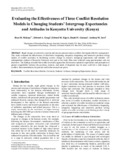| dc.contributor.author | Gatumu, H N | |
| dc.contributor.author | Kigen, Edward M | |
| dc.contributor.author | Ireri, Anthony M | |
| dc.contributor.author | Mokaya, Boaz M | |
| dc.date.accessioned | 2013-06-14T05:56:54Z | |
| dc.date.available | 2013-06-14T05:56:54Z | |
| dc.date.issued | 2013 | |
| dc.identifier.citation | Gatumu, HN. 2013. Evaluating the Effectiveness of Three Conflict Resolution Models in Changing Students’ Intergroup Expectancies and Attitudes in Kenyatta University (Kenya). Education. 3 Export | en |
| dc.identifier.uri | http://profiles.uonbi.ac.ke/hngatumu/publications/evaluating-effectiveness-three-conflict-resolution-models-changing-students%E2%80%99-i | |
| dc.identifier.uri | http://erepository.uonbi.ac.ke:8080/xmlui/handle/123456789/33441 | |
| dc.description.abstract | Rapid changes in university structure and mission present various conflicts that require effective management.
This study evaluated the effectiveness of distributive bargaining, integrative bargaining, and interactive problem solving
models of conflict resolution in facilitating positive change in student’s intergroup expectancies and attitudes. 120
undergraduate students of Kenyatta University took part in the study. Data were collected using questionnaires and oral
interviews. The findings revealed that conflict resolution approaches that increase optimistic expectancies and perceptions of
greater compatibility between the positions, interests, and needs of disputants may be more useful for a wide range of
conflicts. Recommendations for practice and further research are given. | |
| dc.language.iso | en | en |
| dc.publisher | University of Nairobi | en |
| dc.title | Evaluating the effectiveness of three conflict resolution models in changing students’ Intergroup expectancies and attitudes in Kenyatta University (Kenya) | en |
| dc.type | Journal Article | en |

